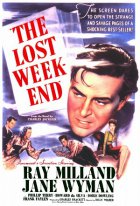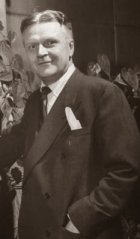
The Lost Weekend Page #6
- NOT RATED
- Year:
- 1945
- 101 min
- 967 Views
Wick slams shut the suitcase, snaps the lock.
HELEN:
Wick, for heaven's sake, if he's
left alone anything can happen! I'll
be tied up at the office every minute,
All Saturday. All Sunday. I can't
look out for him. You know how he
gets. He'll be run over by a car.
He'll be arrested. He doesn't know
what he's doing. A cigarette will
fall out of his mouth and he'll burn
in his bed --
WICK:
Oh Helen, if it happens, it happens.
And I hope it does. I've had six
years of this. I've had my bellyful.
HELEN:
You can't mean that.
Wick takes his suitcase, goes into the living room.
WICK:
Yes, I do. It's terrible, I know,
but I mean it.
Helen follows him.
A-35 LIVING ROOM
Wick comes into the living room, sets down the suitcase and
during the ensuing scene takes a topcoat from the closet.
HELEN:
For heaven's sake, Wick --
WICK:
Who are we fooling? We've tried
everything, haven't we? We've reasoned
with him, we've babied him. We've
watched him like a hawk. We've tried
trusting him. How often have you
cried? How often have I beaten him
up? We scrape him out of the gutter
and pump some kind of self-respect
into him, and back he falls, back
in, every time.
HELEN:
He's a sick person. It's as though
he had something wrong with his lungs
or his heart. You wouldn't walk out
on him because he had an attack. He
needs our help.
WICK:
He won't accept our help. Not Don.
He hates us. He wants to be alone
with that bottle of his. It's the
only thing he gives a hang about.
Helen turns away from Wick, leans against the wall, hoping
he won't see that she's crying.
WICK:
Why kid ourselves? He's one of the
lost ones.
(OR, ALTERNATE LINE:)
Why kid ourselves? He's a hopeless
alcoholic.
Wick leans into the bedroom, snaps off the light. He picks
up the suitcase, puts the topcoat over his arm, takes her
very gently by the arm.
WICK:
Come, Helen.
He leads her towards the entrance door.
A-36 DON, ON THE BENCH IN THE DARK GARDEN
He stares towards the windows.
The bedroom window is dark. In the next second the lights in
the living room go off.
A-38 DON, IN THE GARDEN
He picks up the bottles, rises, walks across the garden
towards the glass door to the hall, peers through it
cautiously.
A-39 STAIRCASE AND HALL, FIRST FLOOR OF THE APARTMENT HOUSE
Wick and Helen come down the stairs, Wick carrying the
suitcase and topcoat. They go out the front door.
A-40 EXT. APARTMENT HOUSE
Wick and Helen have come out. Wick is hailing a taxi.
WICK:
Taxi! Taxi!
(To Helen)
I'll give you a lift as far as Grand
Central.
HELEN:
No thanks, Wick. I'm going to wait
here.
WICK:
You're crazy.
HELEN:
Because I won't give up? Maybe I am.
A taxi drives up.
WICK:
Oh Helen, give yourself a chance.
Let go of him.
HELEN:
Goodbye, Wick.
Wick opens the door of the taxi.
A-41 DON, AT THE GLASS DOOR TO THE GARDEN
He stands with the bag of bottles in his hand, peering through
the entrance hall out to the street.
A-42 STREET (SHOT FROM BEHIND DON)
Wick gets in the taxi, it drives off. Helen paces up and
down in front of the house.
Don opens the glass door, steps cautiously into the entrance
hall.
A-43 ENTRANCE HALL
Squeezing close to the staircase wall so that Helen won't
see him, Don gets to the staircase, then leaps up the stairs
as though pursued.
A-44 EXT. APARTMENT HOUSE
Helen waits outside the house. A couple of kids chasing each
other on roller skates almost run into her. She steps back
and stands in the doorway, looking up and down the street.
A-45 STAIRS BETWEEN THE THIRD AND FOURTH FLOORS
Don is hurrying up on tiptoe, two steps at a time. Suddenly
the door of a third-floor apartment toward the street is
opened. Don flattens himself against the wall, not to be
seen by Mrs. Deveridge, who is coming out with her dog,
Sophie, to give Sophie her evening airing. Sophie gives one
bark in the direction of Don, but Mrs. Deveridge pays no
attention and descends the stairs. Don starts up the stairs
again, as silently and as fast as he can.
A-46 FOURTH-FLOOR LANDING
Don gets to his door, opens it cautiously, slips inside.
A-47 INT. LITTLE ENTRANCE HALL OF BIRNAM APARTMENT
The only light is the light from outside, coming from living
room and bedroom. Don steps inside, closes the door. He
doesn't turn on the light but very carefully adjusts the
chain on the door, puts his hat away.
A-48 LIVING ROOM
Dim but for the light outside. As Don enters, he slips the
bottles from the paper bag and puts them on a table next the
armchair. He crumples the bag and throws it in the fireplace.
He takes one bottle, starts towards a bookcase and is about
to hide it behind the books when he changes his mind. He
looks around the room. His eyes fall on the ceiling. He goes
to the table next the couch, pulls it into the middle of the
room, brushes some magazines to the floor, takes a small
chair, puts it on the table, climbs to the table, from the
table to the chair. He is now directly below the ceiling
lighting fixture, an inverted metal bowl about two and a
half feet in diameter. Don reaches over the edge and deposits
the bottle inside the bowl so it can't be seen from the room.
He climbs down, readjusts the table, the chair, and puts the
magazines back. Don picks up a glass which is over a carafe
on the mantelpiece. He puts it next the bottle by the wing
chair. He opens the bottle, pours a glass about three quarters
full, puts the glass down. He loosens his tie and lets himself
fall into the easy chair. He looks through the open window
on the lights of New York. His eyes slowly wander to the
glass. He smiles. It's a smile of relief, of contentment at
being alone with his vice. There's a little pain in his smile,
too.
THE CAMERA MOVES TOWARD IT until the glass isn't visible any
more -- just a smooth sea of alcohol, with a little light
playing on it. THE CAMERA plunges deep into that sea.
FADE OUT:
SEQUENCE "B"
FADE IN:
B-1 STAIRCASE AND LANDING, FOURTH FLOOR - DAY
Through the skylight streams a dazzling shaft of sunlight,
falling square on the door to the Birnams' apartment.
On the threshold lies a copy of the New York Times, and beside
it stands a quart of milk. Pinned to the door is a piece of
paper from a notebook.
From inside there is the sound of the chain being detached,
and the door opens slowly. Don emerges. He is dressed exactly
as he was the day before -- same suit, same shirt, same tie.
He has slept in them and they are wrinkled. He hasn't shaved.
As he comes out and the sun hits his face, he squints in
agony. As he carefully closes the door, his eyes fall on the
note. He reads it.
"Don dear:
I waited for you to come home. Please be careful.Get some sleep. Eat. And call me, call me, call me. Helen"
Translation
Translate and read this script in other languages:
Select another language:
- - Select -
- 简体中文 (Chinese - Simplified)
- 繁體中文 (Chinese - Traditional)
- Español (Spanish)
- Esperanto (Esperanto)
- 日本語 (Japanese)
- Português (Portuguese)
- Deutsch (German)
- العربية (Arabic)
- Français (French)
- Русский (Russian)
- ಕನ್ನಡ (Kannada)
- 한국어 (Korean)
- עברית (Hebrew)
- Gaeilge (Irish)
- Українська (Ukrainian)
- اردو (Urdu)
- Magyar (Hungarian)
- मानक हिन्दी (Hindi)
- Indonesia (Indonesian)
- Italiano (Italian)
- தமிழ் (Tamil)
- Türkçe (Turkish)
- తెలుగు (Telugu)
- ภาษาไทย (Thai)
- Tiếng Việt (Vietnamese)
- Čeština (Czech)
- Polski (Polish)
- Bahasa Indonesia (Indonesian)
- Românește (Romanian)
- Nederlands (Dutch)
- Ελληνικά (Greek)
- Latinum (Latin)
- Svenska (Swedish)
- Dansk (Danish)
- Suomi (Finnish)
- فارسی (Persian)
- ייִדיש (Yiddish)
- հայերեն (Armenian)
- Norsk (Norwegian)
- English (English)
Citation
Use the citation below to add this screenplay to your bibliography:
Style:MLAChicagoAPA
"The Lost Weekend" Scripts.com. STANDS4 LLC, 2025. Web. 5 Feb. 2025. <https://www.scripts.com/script/the_lost_weekend_173>.







Discuss this script with the community:
Report Comment
We're doing our best to make sure our content is useful, accurate and safe.
If by any chance you spot an inappropriate comment while navigating through our website please use this form to let us know, and we'll take care of it shortly.
Attachment
You need to be logged in to favorite.
Log In